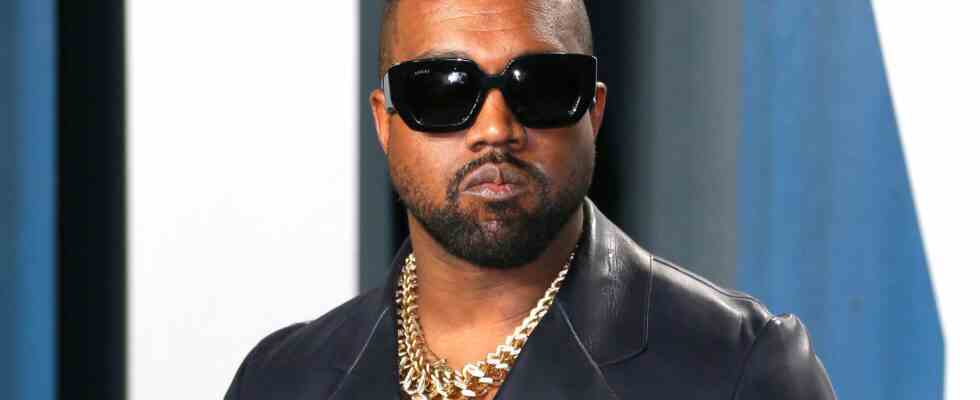Status: 12/29/2022 6:04 p.m
The Wiesenthal Center has denounced the worst anti-Semitic incidents of the year: At the top is rapper Kanye West, and the documenta art exhibition is also represented. It was said that taboos would continue to be broken in Germany.
According to the Wiesenthal Center, US rapper Kanye West is at the top of the list with his statements ten worst anti-Semitic incidents of 2022. West, who now calls himself Ye, in addition to constant anti-Semitic statements, also abused his enormous influence on social media to “use hatred, fanaticism and ignorance as weapons,” the report said. West helped make hatred of Jews part of the mainstream on social media.
In October, Instagram and Twitter suspended the rapper’s accounts for the first time. Elon Musk briefly lifted the ban after taking over the short message service, but then suspended West again in December because the 45-year-old had apparently spread the image of a swastika. His account recently had around 30 million followers.
Adidas announced cooperation with West
West also caused a stir offline: At Paris Fashion Week he wore a T-shirt with the slogan “White Lives Matter”. The Anti-Defamation League classified the sentence as a racist reaction to the “Black Lives Matter” movement. At the end of October, the sporting goods manufacturer Adidas terminated the cooperation and stopped producing the “Yeezy” brand.
Then, in November, a dinner with former US President Donald Trump and far-right nationalist Nick Fuentes made headlines.
Documenta is in eighth place
The 15th edition of the documenta art exhibition in Kassel is in eighth place on the list. “In Germany, taboos surrounding hatred of Jews continue to be broken, fueled by sections of the German government and an art elite that allowed the inclusion of anti-Semitic depictions at the prestigious documenta by a group supporting the boycott of Israel,” it said.
The fact that the work could be exhibited at all shows that there are people, especially in the “cultural elite” in Germany, who believe that “they can mock, deny, threaten and attack Jews with impunity,” the center explained.
The documenta in Hesse was before and during its run from always new allegations of anti-Semitism been shaken. Shortly after the opening in mid-June, a work with anti-Semitic imagery was discovered and dismantled. Even after that, works with anti-Jewish stereotypes were found. The curatorial collective of the documenta, Ruangrupa, was criticized and accused, among other things, of being close to the Israel boycott movement BDS.
Attacks on synagogues in Bochum and Essen
A sub-item of the list also includes general attacks on Jews in Germany, such as those on the synagogues in Bochum and Essen. There are warnings of a further increase in anti-Semitic crimes in Germany. The federal government is also accused of working too closely with the “Holocaust-denying and genocide-threatening regime in Iran.”
The list also included the UN Human Rights Council, which Israel repeatedly accuses of unfair bias, and Palestinian President Mahmoud Abbas. Lastly, the Telegram channel appears, which is said to be used by anti-Semites to spread their hate messages.
List is considered problematic in Germany
The annual list of the Wiesenthal Center is considered problematic in Germany. Last year, the Baden-Württemberg anti-Semitism commissioner Michael Blume was named. The authors accused him of comparing Zionists with Nazis in posts and on networks and of having liked “anti-Jewish, anti-Israel and conspiratorial Twitter accounts”. Blume then received a lot of encouragement from Jewish circles. The Orthodox Rabbinical Conference Germany stated: “Such a decision is proving to be counterproductive in combating anti-Semitism, which is intensifying in these times.” It was “probably a stray” from the center that should be corrected.
The center’s list has often been criticized. In 2013, the publicist Jakob Augstein stood by what the Central Council of Jews in Germany described as unjustified. The admission of the German UN ambassador Christoph Heusgen in 2019 also caused a lack of understanding, as did the mentioning of the Goethe Institute and the German Federal Cultural Foundation in 2020.
The Simon Wiesenthal Center was founded in 1977 with the aim of researching the Holocaust and hatred of Jews in a historical and current context. It was named after the Austrian-Jewish publicist Simon Wiesenthal (1908 to 2005), who was not involved in its founding.
Kanye West and Documenta on anti-Semite list
Katharina Wilhelm, ARD Los Angeles, 12/29/2022 7:54 p.m

